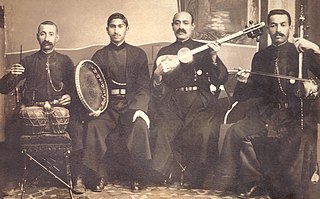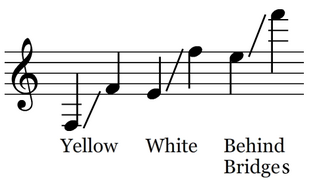
Mohammad-Reza Shajarian was an Iranian singer and master (Ostad) of Persian traditional music. He was also known for his skills in Persian calligraphy and humanitarian activities. Shajarian started his singing career in 1959 at Radio Khorasan, rising to prominence in the 1960s with his distinct singing style.
The music of Iran encompasses music that is produced by Iranian artists. In addition to the traditional folk and classical genres, it also includes pop and internationally celebrated styles such as jazz, rock, and hip hop.
Persian traditional music or Iranian traditional music, also known as Persian classical music or Iranian classical music, refers to the classical music of Iran. It consists of characteristics developed through the country's classical, medieval, and contemporary eras. It also influenced areas and regions that are considered part of Greater Iran.

Hossein Alizadeh is an Iranian musician, composer, radif-preserver, researcher, teacher, and tar, shurangiz and setar instrumentalist and improviser. He has performed with such musicians as Shahram Nazeri, Mohammad-Reza Shajarian, Alireza Eftekhari and Jivan Gasparyan, as well as with a number of orchestras and ensembles.

Ostad Sa'id Hormozi (1898–1976) was an Iranian musician who is remembered for his efforts to "promote authentic Iranian music" and pass it to modern musicians. He was born in one of the old neighborhoods of Tehran called Sangalaj. He was a prominent radif master and virtuoso tar and setar player.
Radif is a collection of many old melodic figures preserved through many generations by oral tradition. It organizes the melodies in a number of different tonal spaces called dastgāh. The traditional music of Iran is based on the radif, which is a collection of old melodies that have been handed down by the masters to the students through the generations. Over time, each master's own interpretation has shaped and added new melodies to this collection, which may bear the master's name.
Dastgāh is the standard musical system in Persian art music, standardised in the 19th century following the transition of Persian music from the Maqam modal system. A dastgāh consists of a collection of musical melodies, gushehs. In a song played in a given dastgah, a musician starts with an introductory gusheh, and then meanders through various different gushehs, evoking different moods. Many gushehs in a given dastgah are related to an equivalent musical mode in Western music. For example, most gushehs in Dastgāh-e Māhur correspond to the Ionian mode in the Major scale, whilst most gushehs in Dastgāh-e Shur correspond to the Phrygian mode. In spite of 50 or more extant dastgāhs, 12 are most commonly played, with Dastgāh-e-Shur and Dastgāh-e Māhur being referred to as the mothers of all dastgahs.

Mugham or Mughamat is one of the many classical compositions from Azerbaijan, contrasting with tasnif and ashik.

Ahmad Ebādi (b.1906 – d.1993) was an Iranian musician and setar player. Born in Tehran, he was a member of the most extraordinary family of Iranian music. Ahmad's father, Mirza Abdollah, is arguably the most influential figure in Persian traditional music, and his paternal uncle, Mirza Hossein-Qoli, is also well known for his mastery in playing the tar. Ahmad's paternal grandfather, Ali-Akbar Farahani, was also a talented musician.

Dariush Safvat also spelled as DaryushSafvat, was a master Persian traditional musician, teacher, and ethnomusicologist. Safvat is best known for his mastery of setar and santur instruments. Safvat was the founding director of the Center for the Preservation and Research of Music in Tehran; and some credit Safvat with saving traditional music from obliteration in the 1970s.
Iranian folk music refers to the folk music transmitted through generations among the people of Iran, often consisting of tunes that exist in numerous variants.

Mohammad-Reza Lotfi was an Iranian classical musician renowned for his mastery of the tar and setar. He collaborated with singers such as Mohammad-Rezā Shajarian, Hengameh Akhavan, Shahram Nazeri and Alireza Shahmohammadi.
The Chemirani ensemble is a notable Persian classical music ensemble.

Master Farâmarz Pâyvar was an Iranian composer and santur player. Payvar died on 9 December 2009 after a long struggle with brain damage. Although once perceived as marginal, the santur is now considered an important solo instrument in Persian classical music, largely as a result of his work. Over the course of his career, Payvar revolutionised its playing, led two major ensembles and made numerous recordings.

Dariush Talai plays both the Tar and Setar.
Iranian/Persian traditional music is now modernly classified into the Dastgāh system. This system is a modal system, in the fact that it utilizes distinct modes of music, in this case seven. Each of these seven modes, referred to as Dastgāh, are then classified into smaller units, each called an āvāz. Every āvāz consists of short pieces and melodies of music called the gousheh that, although each has its own characteristics, share one central characteristic in the āvāz.

Manoochehr Sadeghi is a Persian-American naturalized citizen, born in Tehran, Iran. He is considered an ustad of the santur, a Persian hammered dulcimer. He has been lecturing, teaching, recording and performing Persian classical music on the santur professionally for over 50 years. In 2002, Sadeghi received the Durfee Foundation Master Musician Award and he is a recipient of a 2003 National Heritage Fellowship from the National Endowment of the Arts, which is the United States' highest honor in the folk and traditional arts.

The santur, is a hammered dulcimer of Iranian origins.
Bayat e Turk or Bayat e Zand is a part of Dastgah-e Shur in Iranian traditional music. Some religious texts, like Adhan, are sung in this mode.

Jean During is a French musician and ethnomusicologist specialising in music from the nations of the East especially Iran, Central Asia, Afghanistan and Azerbaijan. A commentator on the Middle Eastern and South Asian cultures, he is the Research Director at the French National Center for Scientific Research and a professor at the University of Strasbourg.











